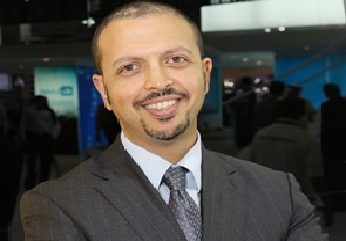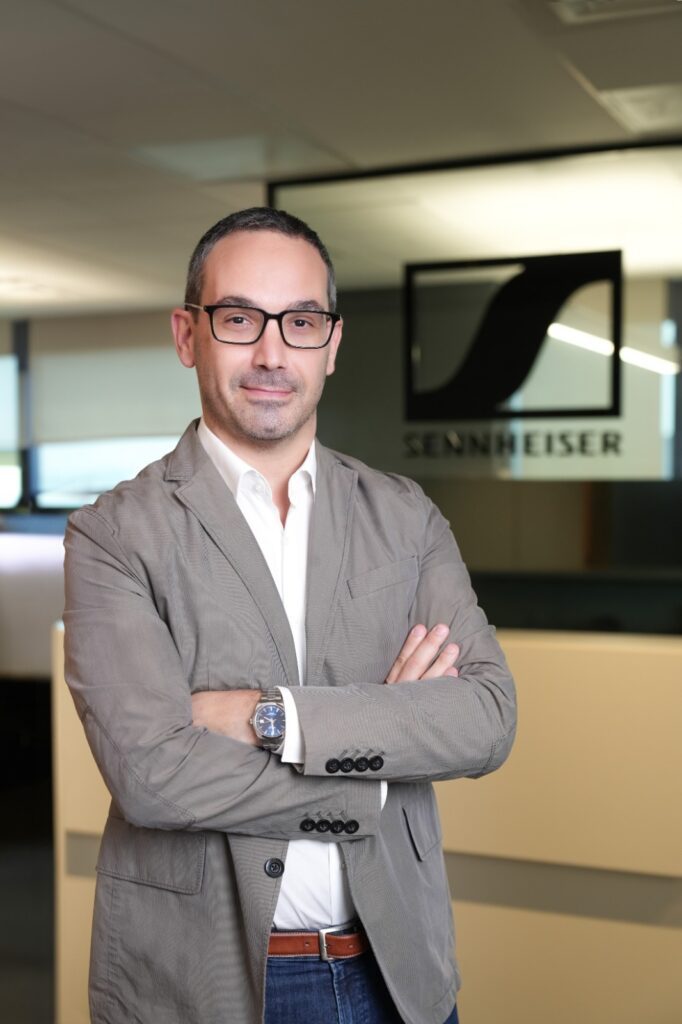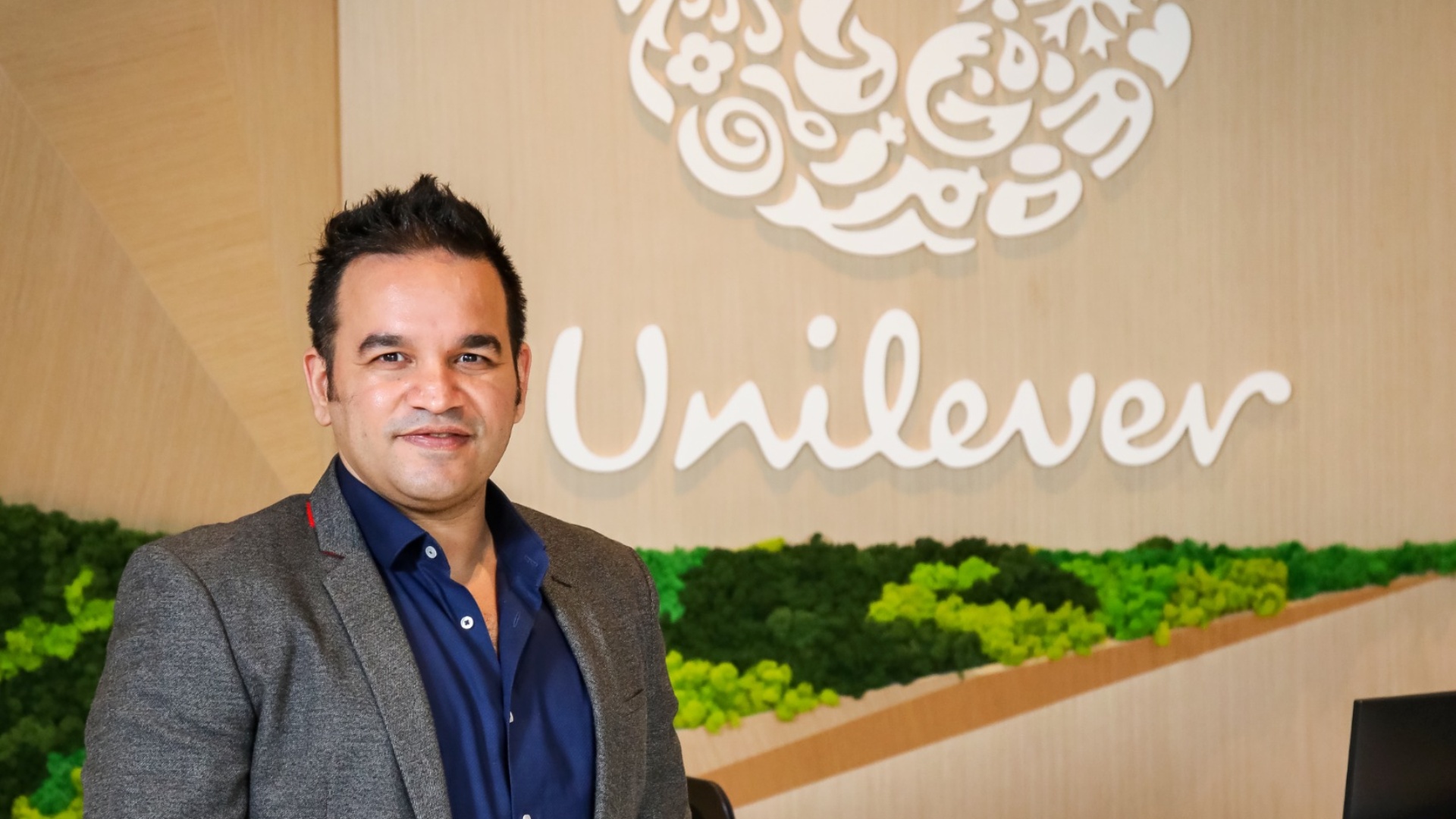Tech Interviews
On the Upswing

By Editor
The buzz around the audacious BlackBerry Passport perhaps illustrates the best the renewed interest behind this mobile pioneer. We caught up with Nader Henein, Regional Director MEA for BlackBerry to shed light on these developments
BlackBerry is in the middle of a renaissance. What is behind this momentum?
Our business is growing exceptionally well. After John Chen, our new CEO, took over last year, we’ve refocused on our core domain which is the enterprise and our enterprise customers. We’ve focused on devices that bring more productivity into the businesses and we’ve been rewarded. A lot of businesses that walked away at some point are welcoming us back. We are launching BES 12, which is our new version of the enterprise server and that is going to bring dozens of additional features for the enterprise focused on getting work done securely, speedily and getting more efficiency out of your day. This has been our core from the very beginning when our co-founders started the business. It brought down the complexity of having secured mail to the simplicity of being able to send and receive an SMS. Right now we are going back to those same lines like government, banking, finance, Insurance, MNCs etc.
How are you making sure that partners are part of this revival?
We’ve seen a lot of partners approaching us telling us they would like to resell and distribute our solutions. We are setting up partners in Africa in countries like Nigeria and Kenya to add to the resellers we already have as well more partners in the Middle East and Africa to be able to cover for the amount of demand we are seeing. In the UAE, our partners include EMS and Axiom while across Africa we have partners such as Dimension Data etc. as well as Ingram Micro as one of our biggest partners globally. This speaks of our commitment and ability to deliver.
This region is very important for BlackBerry-you can see in our product launches. Whenever we do, we launch simultaneously with Dubai as the regional hub with other places such as London and Canada.
Discuss the overall enterprise mobile management market and BlackBerry’s position in it
We are by far the largest enterprise mobility management solutions provider in the market. We have massive deployments all over the world. One customer for instance is the US Department of Defence with over 600,000 devices managed by the Blackberry enterprise server, testament to our scalability and security. Today we have over 100,000 deployments today of the BlackBerry enterprise solutions. That number is larger than the next three competitors combined.
But we are not stopping there. Whenever we speak to customers, we ask the question, “How does the road map look like?” “This is your current product today, but how does your product look like in six months?” This is because only a company that is dedicated to mobility will show you depth in that a roadmap. Unlike us, mobility is not our major competitor’s core focus.
Discuss how your device business, epitomized by the new passport, ties to the overall enterprise mobile management solutions
Within BlackBerry we have multiple Silos. One silo is the device business, the other one is the enterprise mobility management, another one is the solutions business such as BBM with the last one being QNX, the operating system that BlackBerry 10 runs on. QNX is deployed in many other places such as BMW and Porsche cars, GE medical equipment, etc.
So when you deploy a BlackBerry device inside an enterprise and you manage it through a BlackBerry enterprise server, the experience the user gets is second to none. If you look at other solutions and how they manage iOS, Android or Windows devices, it’s like making them do something they are not built to do. However, for us because everything is built under one roof and you get the native experience to everything. All the mails, contacts, address, book, notes, tasks etc., are all in the same place whereas with other solutions you have to keep switching from work to the personal. With BlackBerry for instance, you see all the appointments for the day, both work and personal on the calendar in one interface. The new BlackBerry Passport fits in perfectly with our overall enterprise strategy.
User Experience is of course central to any mobility function. Is UX a major consideration for BlackBerry and its devices?
The beauty of the enterprise solution is that it allows you to, from one interface, pull applications from various app stores and push them to the device and it’s all very simple. You install our solutions and to our server allows you to mobilize all the applications internally and then offer those applications selectively to either all enterprise users or to some of them within groups.
However, our enterprise mobile management solutions are not just available on BlackBerry with support for iOS and Android devices with upcoming BES 12 supporting Windows Mobile as well. Our strategy is to always support all the major operating systems which give you 98% market coverage.
BlackBerry devices are also popular consumer device. How does the company leverage enterprise-grade solutions to build a stronger consumer base?
The most important thing for most people is security; and we do security properly. On the enterprise side we have built military-grade security into the device and the consumer ends up benefitting from those as well. What is called security in the enterprise is referred to as privacy on the consumer end. Both are equally important for us. This can be seen in the way we design our solutions. BBM for instance is not based on your phone number or email but on a unique number or BB ID such that if you want to connect with somebody, it’s an opt-in proposition. Other messaging solutions scan your contact numbers and then connect you with people that you may not necessarily want to connect with. All the information on our devices is also secured with features such as parental controls built in. We also have solutions such as BlackBerry Protect so you can track the device and wipe it clean remotely from a web browser.
What is BlackBerry’s own road map for the next year?
Over the next one year, I see us expanding the current base that we have by driving more depth into existing customers by getting them to mobilize more than their mails. The Middle East region is still in its early stages for mobility adoption. Initially customers adopt mobility to get mails, tasks, notes, calendar and other basis on their device. The second stage is starting to mobilize applications such as CRM. After that, you start looking at small groups and mobilizing their requirements within the enterprise. We consequently want to start moving the traditional mobility to those mature phases.
Tech Interviews
Sennheiser: Beyond Hardware, Toward Seamless Integration

Exclusive Interview with Fadi Costantine, Sales Manager – Business Communication, Middle East at Sennheiser

Sennheiser has leveraged its role in shaping professional audio to build strong hybrid communication products for use across business and education environments. We caught up with Fadi Costantine, Sales Manager – Business Communication, Middle East at Sennheiser, to discuss the brand’s presence at the show, its integrated product ecosystem, and the growing importance of software-driven audio solutions.
What are your most innovative products currently serving the business and education sectors?
Sennheiser operates across several business units, with Business Communication being one of our most important. This unit is entirely dedicated to the installation market, where many of our most dynamic and innovative solutions are positioned.
Professional audio is at the core of Sennheiser’s brand identity. Through our ownership of renowned brands such as Neumann and Merging Technologies, we have established ourselves as a global leader in audio communications. We leverage this expertise to develop advanced meeting and conferencing solutions that enhance business performance.
Crucially, our products are not designed to operate in isolation. They are engineered to work together as a unified ecosystem, enabling seamless communication across devices and platforms. This ecosystem approach allows system integrators and end users to design complete, end-to-end audio solutions tailored to a wide range of applications and project requirements.
Which industry verticals are currently driving demand for these solutions in the region?
While we are active across multiple verticals in the region, we have a clear strategic commitment to deliver innovative, scalable, and future‑ready audio solutions tailored specifically for the needs of higher education and the modern corporate environment.
In corporate environments, our microphone solutions are widely deployed in meeting rooms to support modern collaboration and video conferencing scenarios. In the education sector, our technologies are extensively used in lecture halls and hybrid learning environments, including classrooms and auditoriums designed to accommodate both in-person and remote participants.
A strong example is our ceiling microphone solutions. These are frequently used not only in traditional meeting rooms but also in lecture halls for audio capture, video conferencing, and recording. They are also ideal for voice-lift applications, enabling students to hear the lecturer clearly without the need for wearable microphones. This creates a more natural, seamless teaching experience while minimizing complexity for the user.
Software and integration are critical in these environments. How does Sennheiser support this alongside its hardware solutions?
Workflow optimization has always been central to our product strategy and will remain a key focus going forward.
Introducing a new era in AV Management, at ISE 2026, Sennheiser will officially launch DeviceHub, a secure, cloud-based platform designed for IT and AV managers, as well as system integrators. DeviceHub centralizes device visibility and remote management, streamlining workflows across enterprise, education, and corporate settings.
DeviceHub provides real-time insights, simplified setup, and unified control, supporting organizations in creating better spaces for communication, learning, and teamwork. Following a successful private beta, ISE marks the transition to public availability. Visitors can explore DeviceHub’s capabilities and speak directly with product experts about how it can transform their AV and IT operations.
Tech Interviews
80 Years of Audio Innovation with Sennheiser
Exclusive Interview with Mig Cardamone, Sales Director, Sennheiser

In 2025, Sennheiser celebrated 80 years of audio innovation. From shaping the early days of wireless microphones to redefining modern enterprise communication, the Sennheiser brand continues to evolve alongside changing work and collaboration environments.
Over the past five years, Sennheiser has spotlighted its enterprise and hybrid communication solutions, designed to support seamless collaboration across meeting rooms, lecture halls, and professional content environments. We spoke with Mig Cardamone, Sales Director at Sennheiser, about the brand’s presence, its regional focus across the Middle East, East Africa, and Central Asia, and technologies shaping its future.
We’ve seen Sennheiser’s meeting and conferencing solutions increasingly showcased to the ICT community in recent years. How has that engagement worked for the company?
Engaging with the ICT sector has been a strategic focus for us for several years, both directly and primarily through our distribution partners. Our meeting and conferencing solutions are designed to make business better, and regional platforms such as ISE, GITEX and Infocomm have been instrumental in helping us communicate that message.
Together with two of our most important distributors in our region, Venuetech and Avientek, we regularly demonstrate our TeamConnect (TC) family and related enterprise solutions at major trade shows in the Middle East. These events give customers the opportunity to experience our technologies first-hand, and the response from the enterprise and corporate technology communities has been extremely positive.
Our enterprise solutions are purpose-built for hybrid work and collaboration, enabling seamless, natural communication. They draw on decades of Sennheiser audio expertise—experience that has kept us at the forefront of the industry for over 80 years. In 2025, we proudly celebrated Sennheiser’s 80th anniversary, both here in the region and globally. Our business communication portfolio clearly reflects how the brand has evolved while staying true to its core strengths.
Which products have you focussed on in the enterprise sector?
Sennheiser’s current product focus reflects a clear shift toward software‑enabled, fully integrated audio ecosystems designed for modern collaboration and learning environments. Rather than relying solely on hardware‑centric approaches, the company is increasingly investing in intelligent software layers, automation, and interoperability.
Sennheiser highlights three core application scenarios:
Meeting and Collaboration Spaces
Ceiling‑mounted microphones and software‑based audio processing create a touchless, highly scalable solution for modern meeting environments. These systems integrate seamlessly with leading UC platforms and third‑party control systems.
Higher‑Education and Lecture Capture
Ceiling microphones paired with DSP routing and SpeechLine Digital Wireless systems support clear, consistent audio capture for lectures, hybrid classrooms, and campus‑wide communication workflows.
Integrated Solutions
Through partnerships with technology alliances, Sennheiser also incorporates automated transcription and other software‑driven enhancements, reflecting its evolution into a more holistic, integrated solutions provider.
Beyond the UAE, which regions does Sennheiser Middle East cover, and how are you approaching expansion?
Sennheiser Middle East is responsible for a broad and diverse territory that includes the Middle East, East Africa, English-speaking Africa, and Central Asia. Our expansion strategy is built around strong distribution partnerships.
We work closely with partners who offer both wide regional coverage and deep expertise in the verticals we serve. In the ICT space, we specifically look for partners capable of addressing both IT and AV markets, including unified communications and professional AV system integration channels.
After 80 years of innovation, if you had to choose one Sennheiser product that stands out personally, what would it be and why?
Over 80 years, Sennheiser has consistently pushed the boundaries of what’s possible in audio. We introduced one of the first commercially available wireless microphone systems for broadcast, pioneered RF condenser microphones, and created Orpheus—the world’s finest electrostatic headphone. There have been countless milestones along the way.
That said, I’m very much focused on the future. What excites me most today is Spectera. Launched last year, it is the world’s first wideband, bidirectional wireless ecosystem. Spectera fundamentally changes how wireless microphones are used across applications such as broadcast and live sound, and it is entirely software-defined. It represents the next major step in wireless audio innovation.
Tech Interviews
From Diaspora Intelligence to AI: Unilever International’s Data Revolution

Exclusive Interview with Aseem Puri, CEO, Unilever International
- How is Unilever International using data and analytics to bring underserved and overlooked consumer groups into the center of your decision-making?
Many of the consumers we serve are invisible to conventional market structures, which are usually built around large, well-measured countries and mainstream shoppers. At Unilever International, we have turned that around by defining “underserved consumers” as our starting point: immigrants, global aspirers, and consumers in SMILE (small, island, landlocked, extreme) markets, who are often overlooked by traditional business models – and our business approach is specifically designed around these consumers.
Data analytics is central to our operations. We pull information from SAP, Salesforce and other operational systems into a single digital backbone, so shipment flows, customer orders, distributor stock and sales performance are visible in one real-time view across business functions. Alongside this, we use digital and social listening tools to understand what specific communities are searching for, watching and discussing, and we route those insights directly into innovation, portfolio and media decisions.
That is how we picked up emerging home-care rituals in Korea which inspired the Snuggle room spray and indoor dry range, now accounting for roughly 10% of the country’s fabric softener market. The same logic applies to partnerships: our role in building the ICC women’s cricket platform for brands such as Rexona and Dove was based on data on women’s sports viewership, participation and fandom, particularly in markets like India and the UAE. In this way, our investments are tied to real participation for girls and women and to growth in whitespace markets, not just to media reach.
- Diaspora consumers behave like distinct micro-markets with their own preferences. How are you using predictive modeling to anticipate their needs before they emerge?
For Unilever International, diaspora consumers are not a marginal audience; they are one of our largest growth engines. We serve more than 500 million diasporas across 40 SMILE markets, with a strong presence in the Gulf. We treat each major diaspora as a micro-market, with its own set of preferred brands, formats and seasonal or festive peaks.
Our predictive models combine migration trends, remittance flows where these are available, historic consumption patterns, and digital search and social signals to forecast how, when and where demand is likely to appear. As a result, we do not wait for an out-of-stock alert before acting.
For brands such as Bru, Lady’s Choice and Rafhan, we use forward-looking algorithms to shape assortment and route-to-market for South Asian and Middle Eastern communities in hubs such as the UAE, the UK and Australia.
From the shopper’s perspective, the benefit is simple. When they arrive in Dubai or London, the brands and pack sizes they recognise from home are already available in store or online, such as Ramadan, Diwali or Eid, because our models have anticipated those peaks rather than reacting after the seasons.
- Digital integration and data sharing are becoming standard across retailers and e-commerce platforms. How have these partnerships evolved for Unilever International in the UAE?
In the UAE, we have purposefully moved our relationships with retailers and e-commerce platforms away from purely transactional interactions towards shared value creation. By integrating sell-in and sell-out data feeds into our digital systems, we can see, almost in real time, how diaspora and expatriate shoppers are buying across modern trade and online channels.
This shared visibility allows us to co-create category strategies with key partners. Together, we tailor shelf layouts for Indian, Filipino or African shoppers in specific catchment areas, align promotional calendars to their festive occasions, and optimise e-commerce cut-off times so that late-night orders can still arrive the following day. Data sharing help both parties to reduce waste, avoid duplicated inventory and execute innovations with much shorter and more reliable launch windows.
Our role in brokering platforms such as ICC women’s cricket, announced at a festival in Dubai, also gives our customers access to high-energy brand properties. We then activate these jointly across stores, e-commerce and social channels in the Gulf. This creates a closed loop between data, media and execution that is grounded in the lived experience of UAE consumers, rather than driven solely by internal planning cycles.
- AI adoption is accelerating across supply chains and consumer insights. How is Unilever International using AI to create real value for underserved consumers while enabling faster, smarter growth?
We see AI as a strategic teammate that extends the capability of our people rather than replacing them. Our AI Hub in Singapore co-ordinates how tools are deployed across demand sensing, supply chain and marketing, and human resources. We are moving from isolated experiments to integrated systems that connect marketing, supply chain, finance and resourcing data so that decisions can be made jointly and in real time.
For underserved consumers, the impact is very tangible. AI-driven demand sensing and container optimisation help us keep shelves stocked and navigate complex routes without relying on a single corridor, even when there are disruptions such as the Red Sea crisis. AI-powered social listening highlights niche behaviours, for example Koreans using fabric fresheners as room sprays or searching for indoor drying solutions. These insights led to new Snuggle formats tailored to local needs, which gained share quickly.
We also have a documentation centre of excellence to manage end-to-end paperwork for new and existing product entries. We have partnered with a tech startup to develop an AI-optical character reading programme that supports import and export processes, and optimises container loads with 100% accuracy.
All AI activity is guided by Unilever’s Responsible AI Policy, which requires transparency, human oversight and the ability to challenge decisions in every use case. This balance between speed and responsibility allows us to unlock growth without compromising trust.
- In many emerging markets, data is often limited or incomplete. How do you build a reliable, tech-enabled decision-making system in these environments to ensure accuracy and speed?
Many of the countries we serve, including small islands, landlocked states and conflict-affected territories, do not generate the rich, structured data sets that larger markets enjoy. Instead of waiting for perfect information, Unilever International has built a “good enough to act” decision system that deliberately combines different sources of insight.
We integrate shipment data from our SAP backbone, distributor sell-out data where it can be secured, digital shelf and pricing information, and social listening. We complement this with qualitative insight from local teams, NGOs and institutional partners. In SMILE markets such as rural Laos or East Timor, we overlay container-level visibility so that we can see precisely where goods are located, how long customs processes are taking and where real bottlenecks are forming.
AI-enabled tools help us to close the gaps. We use proxy indicators to forecast demand and plan scenarios to test potential price and promotion moves. Human judgement, particularly from local partners, remains central. Our digital backbone ensures that decisions are fast, repeatable and auditable, even in highly challenging environments.
- Leading a tech-driven organization requires both vision and adaptability. What personal leadership principle has shaped the way you guide Unilever International through digital transformation and fast-moving markets?
The principle that has influenced my leadership most is empathy combined with decisive action. Unilever International delivers products to nearly every country in the world, barring sanction markets, which means our teams work across a wide range of cultures, regulatory environments and infrastructure conditions. If I do not genuinely understand what motivates colleagues, customers and consumers on the ground, even the strongest digital strategy remains abstract.
At the same time, I believe in empowering our teams to experiment and fail forward. This mindset, supported by data and AI, allowed us, for example, to build a direct-to-consumer platform in 100 days and to scale collaborations such as the IHG bulk-amenities partnership, which removes hundreds of tonnes of single-use plastic annually while giving travellers an improved yet sustainable Dove experience.
We embed this way of working through our “digital identity” approach, where leaders explicitly carry digital responsibilities within their titles and objectives. This makes it clear that technology, AI and data are not the concern of a separate specialist team. They are part of how every leader at Unilever International serves underserved consumers and grows the business with both speed and responsibility.
-

 Tech News2 years ago
Tech News2 years agoDenodo Bolsters Executive Team by Hiring Christophe Culine as its Chief Revenue Officer
-
News10 years ago
SENDQUICK (TALARIAX) INTRODUCES SQOOPE – THE BREAKTHROUGH IN MOBILE MESSAGING
-

 VAR10 months ago
VAR10 months agoMicrosoft Launches New Surface Copilot+ PCs for Business
-

 Tech Interviews2 years ago
Tech Interviews2 years agoNavigating the Cybersecurity Landscape in Hybrid Work Environments
-

 Tech News7 months ago
Tech News7 months agoNothing Launches flagship Nothing Phone (3) and Headphone (1) in theme with the Iconic Museum of the Future in Dubai
-

 VAR1 year ago
VAR1 year agoSamsung Galaxy Z Fold6 vs Google Pixel 9 Pro Fold: Clash Of The Folding Phenoms
-

 Automotive1 year ago
Automotive1 year agoAGMC Launches the RIDDARA RD6 High Performance Fully Electric 4×4 Pickup
-

 Tech News2 years ago
Tech News2 years agoBrighton College Abu Dhabi and Brighton College Al Ain Donate 954 IT Devices in Support of ‘Donate Your Own Device’ Campaign









